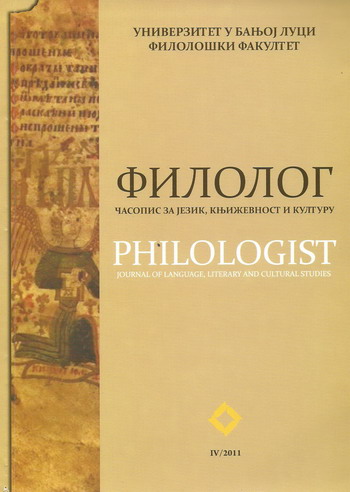Notes on Imp: Imp Voice in Women’s Poetry: Looks at Charlotte Mew, Stevie Smith, Nina Cassian and Wislawa Szymborska
Notes on Imp: Imp Voice in Women’s Poetry: Looks at Charlotte Mew, Stevie Smith, Nina Cassian and Wislawa Szymborska
Author(s): Cherry SmythSubject(s): Poetry, Polish Literature, Romanian Literature, Translation Studies, British Literature
Published by: Филолошки факултет Универзитета у Бањој Луци
Keywords: Imp; poetry; poetic; voice; gender; Szymborska and Cassian;
Summary/Abstract: Just as Susan Sontag’s 1964 essay, ‘Notes on Camp’ nimbly tried to capture the decisive frivolity and blunt whimsicality of camp, I’d like to propose ‘Notes on Imp’. Like camp, which rests on innocence, revealing and despoiling it, the imp grafts a knowing mischievousness onto the serious matters of self-disclosure and vulnerability in contemporary poetry. While gay men, particularly, have developed camp as a strategy and style both in defence of, and to herald their sensibilities in a straight culture, so female poets, especially, use the tactics and tone of the imp as a shield and a vehicle to subvert the powerful inequality in male-female relations.This essay examines how the often-androgynous imp inhabits a netherworld that exists before or beyond gender distinctions. Gender remains overwhelmingly divisive for women: it divides them from the other, the better, as well as dividing them from their prepubescent, untrammelled self. I will demonstrate how the preternatural insights of the imp carry an intrinsic authority, slipping in and out of a third voice, neither male or female – or both – with the precociousness of a child who speaks with too much truth. Whether to avoid state censorship or propriety, poets like Nina Cassian, and Wislawa Szymborska, in an echo of earlier poets like Charlotte Mew and Stevie Smith, adopt a playful cynicism to observe the authoritative (male, adult) world askance.I will argue that the imp addresses high culture and philosophical importance in an underhand fashion, off setting gravity with levity, asserting a gleeful independence and irreverence. The imp speaks for the rule-breakers, the outsiders about the folly of trying to speak of, or for, or about. Yet, like the feathers added to a bird’s wing, the imp adds power and speed to the words’ flight.
Journal: Филолог – часопис за језик, књижевност и културу
- Issue Year: 2011
- Issue No: 4
- Page Range: 48-56
- Page Count: 9
- Language: English

